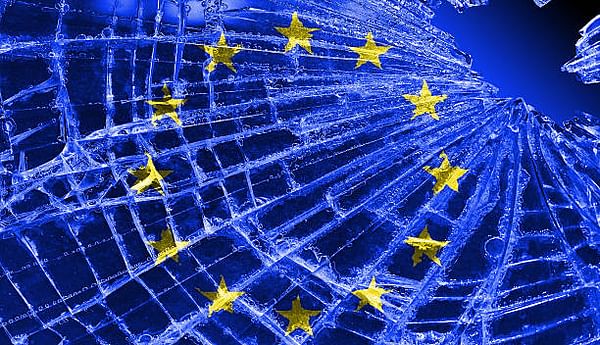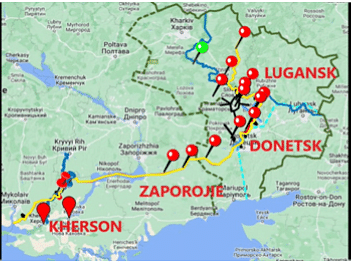No matter how the war in Ukraine turns out, one thing is clear, the EU will be the biggest loser and here are the…
I would like to begin this post with a quote from Winston Churchill: "In war, truth is often the first casualty." This quote has recently gained currency and may make a lot of sense since the start of the war in Ukraine. Indeed, there has been and is a lot of propaganda on both sides, which can influence opinion and obscure the truth on a large scale.

Will Europe pay the most for the war?
Could we get a clearer picture if we stepped back from the officially presented story and avoided any narrative by simply looking more closely at the data?
The numbers and the facts speak clearly, and sometimes it is better to put your emotions aside and make better business decisions with a cool head instead of blindly listening to the wishful thinking of the media.
So what's going on?
- Germany is nationalising the gas giant Uniperto prevent a collapse.
- Europe is buying Russian energy from China, India, Saudi Arabia and Turkey at a much higher price, and we cannot forget shale gas from the United States, of course in US dollars, compared with the much more favourable and stronger euro before.
- Currently, the Euro-Dollar ratio is 0.96.
https://www.youtube.com/watch?v=e2at2BG5LZU
The lights are going out in Europe, is this the solution? :D
- In the UK, the British government has announced that it will pay half of companies' energy bills to help them survive the coming energy crisis.
- France has announced the construction of more nuclear power plants, but such projects are likely to take years or decades to complete.
- What about climate agreements? It is no wonder that, in the absence of consistent leaders, the EU is being forced to ignore previous climate agreements in order to buy other sources of energy, such as coal, from Australia, Indonesia and South Africa... And not from neighbouring countries.
- The fact that the proportion of EU businesses that lost money rose from a normal average of 8% to 15% in the months after the conflict began, and the proportion of businesses at risk of defaulting on their debt rose from 10% to 17% in the same period, according to the European Investment Bank, speaks volumes about how many European economies were affected by the conflict.
It is still very difficult to predict who will win, but one thing is almost certain: the one big loser will certainly be the European Union and its currency, its economy, its fragmentation, etc. The consequences for European countries are not just economic and welfare shocks, but also geopolitical consequences.
Although not all European countries are heavily dependent on Russia for oil and gas, Russia is such an important supplier to the international oil and gas markets that the disruption to trade, particularly as a result of sanctions against this major supplier, has translated into higher prices, leading to higher production costs in many areas. This is particularly the case in European countries.
Those EU countries, including Germany and France, which are heavily dependent on Russia for oil and gas, are bearing the brunt of the economic sanctions that Washington has imposed against Russia.
As a result, inflation has become a scourge that is having a serious impact on the quality of life of people in EU countries. The prices of many basic products, such as wheat, fertiliser and gas, are rising steadily and, according to expert estimates, are expected to rise by 6% this year. Rising prices will dampen demand, which in turn will affect economic growth and increase food and energy prices. This is a vicious circle for the overall economic situation in the EU countries.
It is no wonder that protests have been held in some EU countries against the military support for Ukraine, with protesters demanding that their governments focus on the everyday needs of the people. Indeed, the most vulnerable groups in EU countries have been hit hardest by the worst inflation in decades.
The view on the mobilisation of the Russian army may also be twofold, but the fact that referendums on the linking of several territories with the Russian Federation will be held in the near future is also a consideration.

Given that a number of people in these separatist-controlled areas are Russian-speaking and probably the majority are pro-Russian, we can expect them to vote in favour of joining the Russian Federation. Therefore, as I wrote, it seems likely that Putin has declared a "partial mobilization" to turn the Russian army into a defensive one if Ukraine sabotages it with the help of Western countries. /I write that this is one possibility, not that I explicitly think so.../
If the EU had achieved anything before the conflict began in asserting its own presence as an independent political bloc on the stage of international politics, the worst conflict on the continent since the end of the Second World War has thwarted all its efforts to become a political force that can keep its distance from the United States.
By starting the war, the United States succeeded in reaffirming its leadership role in the North Atlantic Alliance. The EU, which is afraid to stand on its own feet, has followed the US example. The fact that the EU stood up for Ukraine under US leadership is a choice it made. While the US has emerged very well from the conflict, the EU's economy and the standard of living of its people are taking quite a beating and its future as an independent political pole on the global geopolitical stage seems increasingly out of reach.
If you like this post you can give me a follow and enrich this post with your views and comments.